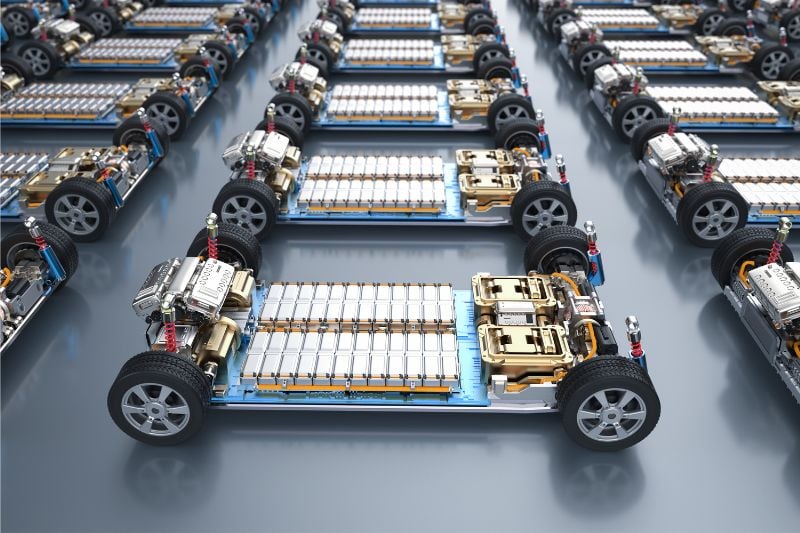Next-Generation Batteries: Energy Transition Powered by Japan
Japan is leading the charge in the technological revolution, particularly in pioneering the development of next-generation battery technology, such as solid-state batteries. This innovation is transforming the electric vehicle (EV) sector, renewable energy storage solutions, and the overall global energy scenario.

EV battery packs. Image used courtesy of Adobe Stock
The Panasonic-Tesla Collaboration: Setting Industry Standards
The partnership between Panasonic and Tesla symbolizes a significant milestone in the global battery industry. Their collaboration led to the construction of the Gigafactory in Nevada, a crucial development in mass battery production and technology advancement. This collaboration has allowed Tesla to secure a stable supply of high-quality batteries, which are critical for the production and expansion of their electric vehicle line and energy storage products. The Gigafactory is designed to significantly reduce battery cell costs through economies of scale, innovative manufacturing, waste reduction, and the optimization of co-located processes.
Panasonic and Tesla have been pushing forward with developments in battery technology, particularly with the 4680 battery cells, which are seen as a key innovation for the future of electric vehicles. Panasonic has announced a delay in the commercial production of these cells, now expected to start between April and September 2024, to enhance their performance. This adjustment aims to make the batteries more competitive by improving their aspects, which could include material composition and the production process itself. Despite the delay, Panasonic is committed to expanding its production capabilities, particularly at Tesla’s Nevada Gigafactory, with plans to boost electric vehicle battery output by 10% within three years. This improvement could add over 100 kilometers (62 miles) to the driving range with the same size battery pack, or allow for the creation of roomier and lighter electric vehicles while maintaining the current range. Panasonic aims to achieve this by introducing a new mix of additives to increase the voltage capacity of individual cells without degrading performance.
The company is also developing ways to slow battery degradation at higher voltages and is planning to start mass-producing the 4680 batteries, which are expected to lower production costs and improve range. Additionally, Panasonic has announced plans to build a new battery cell factory in Kansas, aiming to produce 30 GWh of battery cells to supply Tesla’s vehicle production. This facility is expected to start mass production by the end of March 2025, initially focusing on producing 2170 battery cells, which are currently in high demand. The new Kansas factory is part of Panasonic’s strategy to strengthen battery production capacity in North America to meet the growing demand from automotive partners. The partnership between Tesla and Panasonic is not exclusively for Tesla to produce their own batteries, but rather continues to evolve. Moreover, Panasonic is set to begin mass production of a new lithium-ion battery for Tesla before the end of March 2024 in Japan. This new battery format is expected to lower production costs and improve vehicle range for Tesla, indicating a continuing and evolving collaboration between the two companies.
This partnership also has broader implications for the global battery market and electric vehicle industry. It’s driving down the cost of lithium-ion batteries, making electric vehicles more accessible to consumers and promoting a shift away from fossil fuels. The success of the Gigafactory has spurred other companies worldwide to consider similar investments in battery production facilities, thereby accelerating the global transition to renewable energy and transportation electrification.
Solid-State Batteries: A Game Changer
Solid-state batteries mark a transformative advancement in battery technology, diverging significantly from the conventional lithium-ion (Li-ion) systems that have dominated the market for decades. These batteries stand out primarily due to their higher energy density; they can store significantly more energy in the same volume compared to their Li-ion counterparts. This characteristic is particularly beneficial for electric vehicles (EVs), as it translates into lighter battery packs and longer driving ranges on a single charge, addressing two of the most substantial consumer concerns regarding EV adoption.
The core innovation within solid-state batteries lies in their use of a solid electrolyte instead of the flammable liquid found in traditional Li-ion batteries. This fundamental shift not only reduces the risk of battery fires and explosions – a critical safety concern that has plagued Li-ion technology – but also contributes to longer battery life and improved overall battery performance. The solid electrolyte is less prone to degradation and wear, leading to batteries that could last much longer than their Li-ion counterparts before needing replacement.
Toyota, a pioneer in hybrid technology and one of Japan’s leading automotive manufacturers, is aggressively pursuing the development of solid-state battery technology. The company has set ambitious goals to commercialize these batteries for use in EVs within this decade. Toyota’s commitment to this technology stems from its potential to significantly enhance the appeal and performance of EVs by offering quicker charging times, longer ranges, and increased safety.
This is part of a broader national movement, positioning Japan as a leader in the next wave of battery innovation. The successful commercialization of solid-state batteries by Toyota and other Japanese firms could have far-reaching implications, potentially reshaping the global automotive landscape. It could accelerate the adoption of EVs worldwide, reduce dependence on fossil fuels, and contribute significantly to global efforts to combat climate change by lowering CO2 emissions from the transportation sector.
Murata Manufacturing: Broadening the Horizon
Murata Manufacturing extends the application of solid-state batteries beyond automotive, targeting consumer electronics and energy storage solutions. This diversification showcases the potential of Japanese battery technology to influence various sectors, enhancing energy storage solutions for a wide array of applications, from portable electronics to grid storage. In consumer electronics, they enable lighter, more durable devices, while in energy storage, they provide reliable solutions for integrating renewable energy into the grid. Murata’s advancements demonstrate Japan’s role in enhancing global energy solutions and transitioning towards more efficient, sustainable energy use.
Implications for the Global Market
The advancements from Japanese corporations such as Toyota and Panasonic significantly influence the international battery landscape. As their innovations progress to mass production, they are anticipated to reduce costs and improve performance, leading to broader acceptance of electric vehicles and renewable energy systems globally. This evolution is crucial for the worldwide push towards electrification and sustainability, promoting cross-border cooperation and the exchange of technology.
Japan’s commitment to battery innovation is setting new benchmarks for energy storage and vehicle electrification. Continuous R&D, combined with strategic public-private partnerships, is essential for maintaining this momentum. As Japanese companies lead by example, they pave the way for a global transition towards more sustainable, efficient, and safe energy solutions.
At GetAhead, we specialize in local support for battery technology sourcing, quality management, and supply chain breakdown analysis, focusing on the entire journey from battery systems to raw materials, all within close proximity to the source in Asia. Our team would like hear about your challenges in this field. We are keen to learn about your challenges in this domain and discuss how we can assist.


